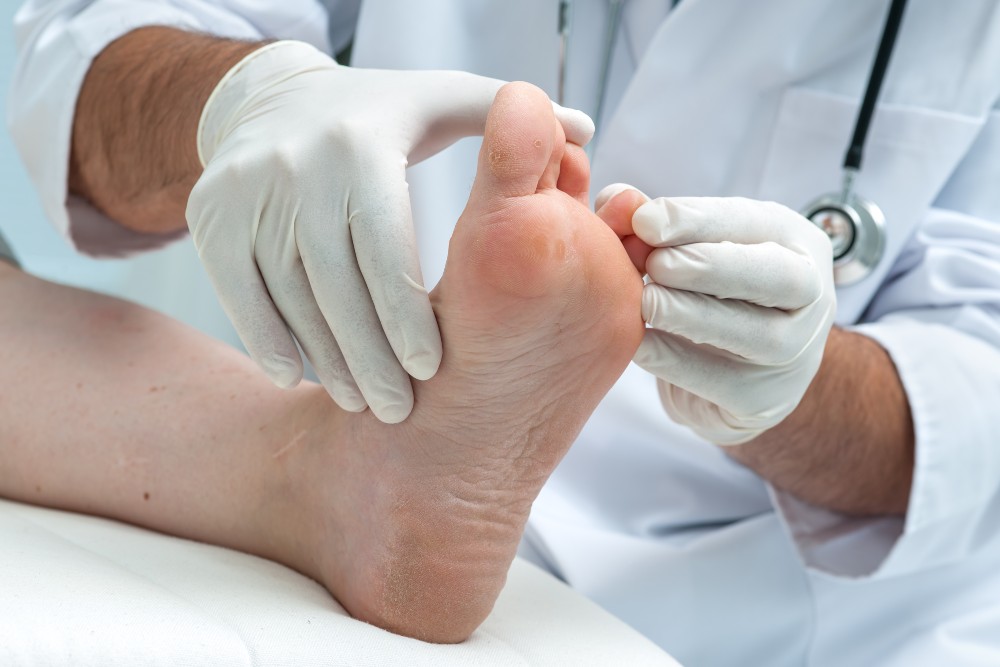Hammertoes
Hammertoes are a common foot condition that can cause intense pain and discomfort. Like other toe deformities, hammertoes can make choosing proper footwear that fits your feet very difficult. Many times people will just end up avoiding footwear altogether because of the pain caused by hammertoes. Hammertoes can cause intense pain even when just walking or standing for long periods.
What Causes Hammertoes?
One of the leading causes of hammertoes is genetics. If one or more of your family members have hammertoes, you may be more likely to develop the condition. Arthritis is another common cause of hammertoes. Osteoarthritis, rheumatoid arthritis, and post-traumatic arthritis can all lead to hammertoes.
Certain types of foot injuries can also cause hammertoes. Trauma to the toes or foot, such as a broken or sprained toe, can cause the muscles and tendons to shorten, leading to hammertoes.
Wearing shoes that are too tight or have high heels can also cause hammertoes. Shoes that are too tight can put pressure on the toes and force them into a bent position. High heels can also cause hammertoes by putting added pressure on the toes and altering the foot’s natural position.
Severe bunions can lead to a person developing hammertoes for the same reason as wearing shoes that are too tight. The big toe that has been forced sideways into the middle toes can cause them to develop into hammertoes.
People with certain foot conditions, such as flat feet or high arches, may also be more susceptible to developing hammertoes. Flat feet can cause the muscles and tendons in the foot to work harder, leading to hammertoes. High arches can cause the toes to bear more weight than they can handle, which can lead to hammertoes.
In some cases, the cause of hammertoes is unknown. However, understanding the underlying causes can help determine the best treatment course.
What Causes
Heel Pain?
When we talk about heel pain, it most often refers to pain felt in the bottom or back of the heel.
While the heel bone itself is a relatively large structure compared to other parts of the foot, there are also many surrounding structures that can be responsible for the pain.
The most common form of heel pain is plantar fasciitis, the inflammation of the thick band of tissue that runs beneath the foot and connects the base of the toes to the heel.
Another common cause is Achilles tendinitis, inflammation of the tendon that connects the heel bone to the calf muscle.
Many other less common causes include arthritis, stress fractures, bursitis, Haglund’s deformity, heel spurs, tarsal tunnel syndrome, a bone infection, a stone bruise…
Like we said, there are many potential causes. Having the correct diagnosis and understanding the underlying reasons it has happened will guide our path to effective treatment.
Surgery
Surgery may be necessary in severe cases of hammertoes to correct the condition and alleviate pain and discomfort. The specific procedure will depend on the individual case and can include various options.
One option is the removal of bony growths that have formed on the toe. These growths, known as exostoses, can cause pain and discomfort and be removed through surgery.
Another option is straightening the toes. The procedure, known as arthroplasty, involves the realignment of the bones in the toe to correct the hammertoe deformity. This procedure can be done on one or more toes, depending on the severity of the condition.
A third option is the release of tendons or ligaments. In some cases, the tendons or ligaments in the toes may be tightened or shortened, causing the hammertoe deformity. The release of these tendons or ligaments can allow the toes to return to a more natural position.
Recovery time and the success of the surgery will vary depending on the specific procedure and the individual case. Physical therapy may be required post-surgery to help regain strength and range of motion in the toes.
Let Us Treat Your Hammertoes!
If you are experiencing pain or discomfort from hammertoes or any other foot and ankle condition, please get in touch with us to schedule an appointment. Our team of experts will work with you to determine the best course of treatment and help you find relief.
You can call our office at 703-560-3773, or if you prefer, please fill out our online contact form on our website. We look forward to speaking with you and providing you and your loved ones with exceptional foot and ankle care!

